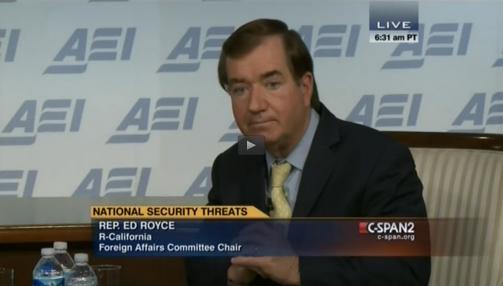BBG Watch Commentary
House Foreign Affairs Chairman Rep. Ed Royce (R-CA) continues to argue for splitting different elements of U.S. international outreach into more specialized and more manageable units which would be run by strong CEOs and overseen by engaged boards. He believes that this reform, supported by all Republicans and Democrats on the House Foreign Affairs Committee, would put an end to current mismanagement and lack of oversight under the Broadcasting Board of Governors (BBG).
Congressman Royce and other congressional supporters of the the United States International Communications Reform Act of 2015 (H.R. 2323) are, however, encountering opposition to their two-boards, two-CEOs reform proposal from BBG Chairman Jeff Shell and from newly-appointed BBG CEO John Lansing. In opposing the key reform of H.R. 2323, which was unanimously approved by members of the House Foreign Affairs Committee, Shell and Lansing argue that one “empowered CEO” is enough. They also claim that management reforms at the BBG are already being implemented.
Congressional sources tell BBG Watch that members of Congress of both parties are very disappointed that John Lansing is “leading the charge,… trying to convince Senate members to reject H.R.2323,” and that he is doing this apparently at “the direction of Jeff Shell.” Our sources told us that such opposition from Lansing and Shell suggests that in their minds “the status quo is working.” “Does anyone actually believe that the status quo is working?,” a senior congressional staffer asked a rhetorical question.
Lansing and Shell argue that two boards and two CEO would lead to confusion, but their critics counter that the current formula that Lansing and Shell want to improve has made the agency defunct. These critics point out that the de-centralized model allowing for maximum flexibility was what made U.S. international outreach very successful during the Cold War. This was achieved by dividing different and sometimes conflicting outreach functions between the United States Information Agency, the Voice of America, and Radio Free Europe and Radio Liberty. H.R. 2323 is based on what worked spectacularly well before the Broadcasting Board of Governors was created in 1999, critics of the BBG say.
###
HOUSE COMMITTEE ON FOREIGN AFFAIRS PRESS RELEASE
Chairman Royce at AEI Discusses the Need for the U.S. to Confront the Weaponization of Information
JAN 8, 2016
Washington, D.C. – Earlier today at the American Enterprise Institute, House Foreign Affairs Committee Chairman Ed Royce (R-CA) talked about the need for the Obama administration to step up efforts to confront the weaponization of information by ISIS, Putin, Iran, and others. Video and excerpt are available below:
“I was in Eastern Europe, in East Germany, on an exchange program years ago. I saw the effects of Reagan’s orchestration of those broadcasts under Radio Free Europe [and] Radio Liberty…
[W]e were sharing our values … political pluralism, freedom, free speech, freedom of religion, tolerance… and people were listening to this. This is what should be going on now with respect to our broadcasts into Eastern Europe and into Russia.
“[E]ven the administration says that broadcasting is practically defunct. So the legislation that myself and Eliot Engel are moving addresses that in two ways. You put a strong CEO in charge of this instead of nine members of the board that can’t make a quorum. You let that CEO run it day to day and you give that CEO the mission that we once gave Radio Free Europe/Radio Liberty. And you get us back up countering what Putin is doing with his propaganda machine and RT television along with what ISIS is doing.”
NOTE: Chairman Royce is the author of the United States International Communications Reform Act of 2015 (H.R. 2323), bipartisan legislation to improve the missions, objectives, and effectiveness of U.S. international broadcasters, which are overseen by the Broadcasting Board of Governors (BBG). Enacting this important reform measure is a top priority for Royce and the committee this year. More information about the Chairman’s efforts to reform our broken U.S. international broadcasting is available HERE.
###
